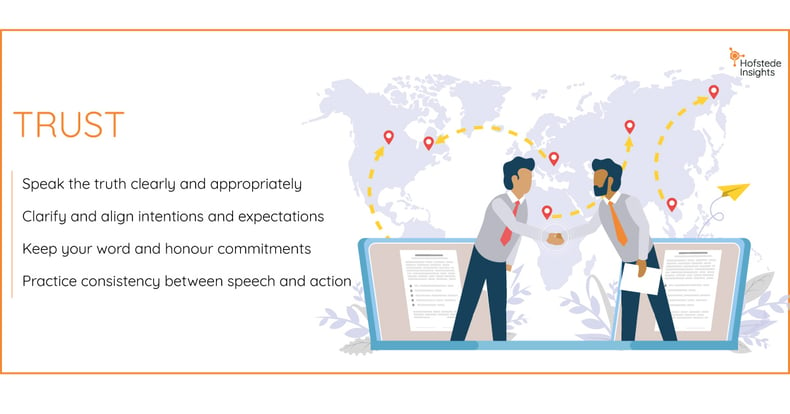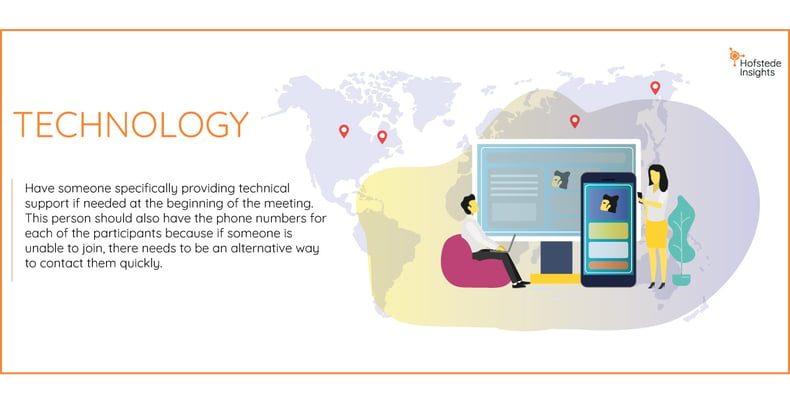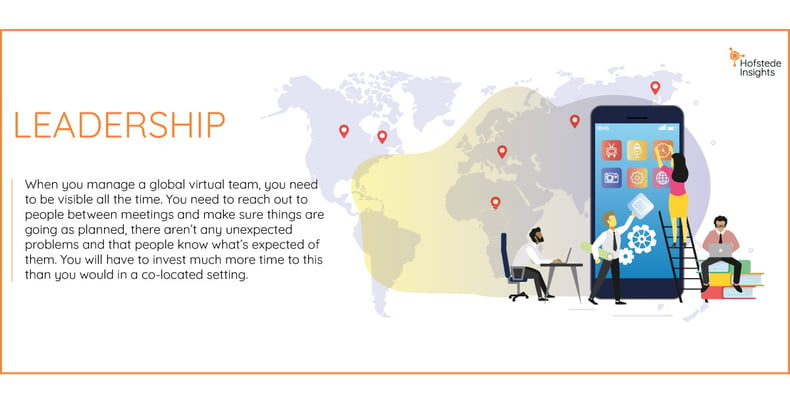- Solutions
-
Solutions
Transform your business with the power of culture.
-
-
Solutions for Individuals
Whether you work in a management team of a multicultural company or work as a consultant in the cultural field, we have solutions tailored to your business needs.
-
Solutions for Organisations
By utilising our research-based and practical approach we ensure that the results of the interventions are immediately applicable and with lasting effects.
-
-
- Resources
- Insights
- Network
- About us
Managing Global Virtual Teams - 5 key factors

With no end in sight for the outbreak of coronavirus, a number of global companies have began to restrict business travel and many countries have asked citizens to work from home. For remote work productivity, as well as teaching online, you can already find a lot of good information and lists of tips. However, best practices for dealing with the travel restrictions seem to be much more scarce. For this reason we decided to publish our five key factors to keep in mind when working virtually in a cross-cultural environment. These factors are derived from our experienced, online facilitators and are primarily geared towards managing global virtual teams, but can also be applied to cross-cultural business meetings, negotiations, trainings and workshops.

1. Time and distance
What time would you like to start a meeting? Would you prefer 9AM, 7PM or as early as 4AM? In global virtual meetings you can have them all in one meeting.
It may sound obvious that time zones can play a significant role in global teams, but that’s also why it can be so easy to forget and simply think, “it’s just time difference, we’ll deal with it,” until all of a sudden you quickly set up a call for 9AM in Berlin, which just happens to be 7PM in Melbourne and 4AM in New York.
Time difference should be kept in mind with all communications. If possible, try to rotate calls; schedule in a way that is evenly spread and that it’s not always the same people suffering from awkward call times.
If team members are scattered all over the globe, the convenient window of time for a call might be very narrow and you may find yourself sending a lot of emails. Remember that even if you email someone first thing in the morning, the recipient might have just finished his or her workday and will not even see the message until the next day.

2. Trust
Can you really trust someone you’ve never met? How do you know they’re doing what they said they’d be doing if you never meet them in person? Building trust can be a challenge even in face to face encounters. A virtual environment and a mix of cultures both add an additional layer to that challenge. But that doesn’t mean it can’t be done.
Trust as a topic is complex enough to warrant its own workshop, but below you will find some of the most crucial factors to keep in mind when building trust in a global virtual team.
-
Speak the truth clearly and appropriately
Online environments have a tendency to increase miscommunication in general. And cultural differences can also cause misunderstandings. This is why clear communication is crucial. When you express yourself honestly and tell the truth, you become more reliable in the eyes of others because you increase the predictability of your behaviour.
-
Clarify and align intentions and expectations
When your intentions or expectations are implied, not clarified, you risk misinterpretations. If as a result of these misinterpretations the results are not what was expected, the level of trust in the team will decrease. When you clarify your intentions, expectations, and requests, you promote transparency in the team and increase trust.
If you ask someone to deliver you a project plan, you should also make sure they know what kind of a project plan you mean. If you tell them to deliver the project plan as soon as possible, you should make sure they know whether you expect them to work long days and take overtime delivering it literally as soon as humanly possible, or if you mean that there is no pressure and they should deliver the plan when they have the time.
-
Keep your word and honour commitments
One of the oldest behaviours that fosters trust and accelerates it in relationships between people and groups is to keep your word. Remember that a promise is a promise! When you make appointments, do it carefully, and, once set, honour them. Make it one of the things you are known for.
If you are unable to fulfill a promise due to factors out of your control, let the people know that you will not be able to do it. By taking action, you are much more likely to continue to be seen as a trusted person.
-
Practice consistency between speech and action
What you do is what people trust you to do. If you say one thing and do another, you appear inconsistent and can seem untrustworthy. Actions really do speak louder than words when building trust.

3. Technology
Due to the time differences, you have an evening meeting scheduled. You join on time, just to find out that two out of five people have not yet joined. After a few minutes it turns out that the missing team members are having technical difficulties. After about 20 minutes of trying one of them finally manages to join. The other one will not be able to attend because of the security restrictions at their office.
You won’t find many virtual teams that have never had any technical problems. Nevertheless, you should do your best to minimize them.
Preventing technical difficulties starts by not taking anything for granted. You might use your messenger daily but others might have no experience with it at all. Someone might be able to install an alternative messenger without any issues while others might not have the technical knowledge for that or might work in a strict security environment where the IT team is required for all installations. You might have a steady internet connection but someone else might be relying on a much slower or unreliable one.
If you manage a global virtual team, you should start preparing for the first meeting way in advance. You should find out what kind of internet connections people have, and if they would be able to access a better one for the meetings if needed. You should make sure everyone is able to install and use the meeting software and maybe consider having a short call with everyone in advance to make sure everything works. And still, you should make sure everyone joins the meeting a bit before it is scheduled to officially begin in case of unexpected technical issues.
It’s also a good idea to have someone specifically providing technical support if needed at the beginning of the meeting. This person should also have the phone numbers for each of the participants because if someone is unable to join, there needs to be an alternative way to contact them quickly.

4. Leadership
Already by reading this far you may have noticed how different it is to lead a global virtual team than a co-located one.
When you manage a global virtual team, you need to be visible all the time. You need to reach out to people between meetings and make sure things are going as planned, there aren’t any unexpected problems and that people know what’s expected of them. You will have to invest much more time to this than you would in a co-located setting.
The cultural element enhancing the importance of this is that you also have to know how to approach this. In some cultures, the manager is expected to follow up closely. Inspecting the subordinates’ progress is seen as a sign that the manager has interest in what is being done and lack of inspection seems like they don’t really care. However, in other cultures constant follow-ups may seem like a sign of distrust. Therefore, you should know who you’re dealing with and approach the situation accordingly.
During meetings you should be aware of personal and cultural differences of the team members. What does it mean if someone is silent? It can be a sign of agreement but it can also be a sign of disagreement. It can be a sign of respect but it can also be a sign for a lack of interest. Or perhaps you yourself come across as talkative from the viewpoint of the others and they feel they’re unable to contribute anything.
Our Culture Compass can be a great tool in finding out cultural preferences between your culture and the culture of those you’re working with.

5. Culture
“It is important for a manager to have at hand precise answers to most of the questions that his subordinates may raise about their work.” Do you agree?
This statement is often used in demonstrating how the leadership preferences can vary quite a bit based on the culture. In many cultures managers are expected to focus on managing the people and make sure they have what they need in order to be effective. But in many other cultures a manager is expected to be an expert on the field he or she operates in.
Culture, in the sense we use the word, inherently plays a role in everyone’s behaviour. Already earlier we’ve addressed the importance of knowing what cultures you’re dealing with and what that might mean in practice for the dynamic of the global virtual team. What people expect from you or other team members will depend on culture. How they interpret things, how they behave, what they signal with their behaviour and what they prefer will also depend on culture.
Once again we recommend our Culture Compass, for finding out the potential pitfalls you might face when working with different cultures. Additionally, you should work on establishing personal relationships with everyone in your team so you’re able to understand them as individuals, and that they will be able to understand you. With a global virtual team, this will require more time and energy than what you may be used to in a face-to-face setting.
We hope this guide has helped you. For further information see our previous article on How to create team spirit in a Global Virtual Team .
